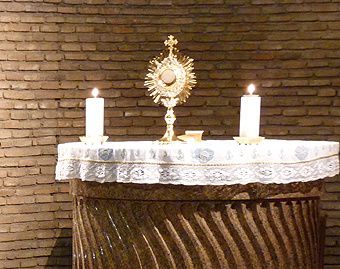“They are Israelites, and to them belong … the promises” (Romans 9:4).
So said Saint Paul as he reveled in his Jewish heritage, his ancestry in the Tribe of Benjamin.
And I like to think I have at least a little bit of Saint Paul in me. I’m like him in at least one way: I have Jewish ancestry, and I’m pleased about that.
I come from a line of Russian hasidim who fled the tsar at the turn of the last century. I was raised in L.A. with at least some of the customs that have been integral to the life of the Jewish people for thousands of years.
And I, like Saint Paul, was raised to know that “the promises” belonged to us.
Also like Paul, I came to know Jesus Christ in my adulthood. The experience knocked me over, dazzled me with its light, and changed me forever. And I came to know that the promises were now fulfilled — in Jesus!
In the Hebrew Scriptures we read in synagogue we heard the promise of a coming Messiah. We heard that he would establish God’s kingdom on earth. We heard too that he would share God’s spirit with all his people. We heard that Israel would be seen and respected as God’s firstborn among the nations, and a son of David would rule the world with gentleness.
We also heard mysterious prophecies about a suffering servant who would bear our sins and whose scars would heal us.
So many of our oracles remained enigmas to me until I saw them through the lens of fulfillment — until I saw them in the light of Jesus Christ shone backward and forward in history.
Backward we see “the promises,” and today we enjoy the fulfillment, most especially in the Eucharist, which is the source and summit of Christian life. Jesus established the Eucharist to be the New Covenant in his blood. He commanded that we “do this” in remembrance of him, just as God had mandated the covenant rites of ancient Israel.
Even then, however, the promise was woven into the fabric of Israel’s life, the words of its Scriptures. As Christians we see the Eucharist foretold and foreshadowed in so many places. Consider just a few.
The bread and wine offered by Melchizedek, whom Israel saw as anticipation of the Messiah (Genesis 14:18).The manna given to the tribes during their desert sojourn (Deuteronomy 8:2-3).The sacrificial “blood of the covenant” (Exodus 24:8).The bread of the presence offered in the Temple (Leviticus 24:5-9).Wisdom’s Banquet (Proverbs 9:1-6)The miraculous bread that sustained the Prophet Elijah (1 Kings 19:5-8; see also 17:12-16).Isaiah’s feast (Isaiah 55:1-3).The food of angels given to human beings (Wisdom 16:20-26). The pure offering, from the rising of the sun to its setting, foretold in Malachi 1:11.
In times past, God made his promises — he spoke in these partial and various ways to my ancestors through the prophets. In the fullness of time, however, he spoke to us through a Son, whom he made heir of all things and through whom he created the universe.
Jesus, the son of God, revealed the fulfillment of the promises as he gave us the Eucharist at his Last Supper.
Is it any wonder that the early Christians were so devoted to the Mass (see Acts 2:42)? They were devout Jews. They saw what was happening, and it made them rejoice.
Saint Paul dedicated a huge chunk of one of his most important letters, his First Letter to the Corinthians, to the Eucharist. He speaks of it in terms of promise and fulfillment. He evokes the lamb and unleavened bread of the Passover (1 Corinthians 5:7-8), now fulfilled in the bread that is our share in Jesus’ body and blood (1 Corinthians 10:16-18). Then he goes on to give instructions for proper celebration of the liturgy, concluding: “For anyone who eats and drinks without discerning the body, eats and drinks judgment on himself” (see 1 Corinthians 11:17-34).
Like Saint Paul, I’m devoted — to the point of amazement — to the Eucharist. You should be, too. God gives himself, just as he promised. When we truly “discern the body,” we know that we could not ask for more than we’ve been given.

